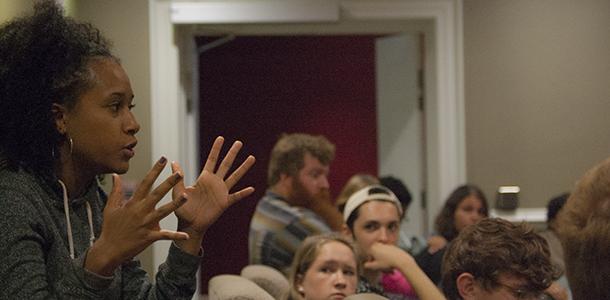Senate will not fund security cameras
Junior Nahja Zigbi-Johnson speaks at the recent Senate Meeting where the group decided not to fund security cameras.
Tonight at Senate, the community decided not to fund security cameras. After intense discussion, attendees came to consensus that they did not want to use the Senate rollover fund for this purpose.
In addition to discussing security cameras, students voiced concerns about the school’s justice system, root problems with security, impacts on students of color and representation of the student body at the meeting.
Senate previously discussed this subject at two past public meetings, but this meeting had the greatest attendance with over 85 people.
“I’ve never seen so many people in this space and I’ve been here for four years,” said senior Layla Rafaoui.
Students and faculty offered alternative ways to spend money.
“If you want to send folks to a bystander training, if you want to propose different trainings around safety and sexual health and wellness, please come (to the Senate Budget Committee meeting) on Mondays at 6 o’clock,” said Director of Student Leadership & Engagement Steve Moran. “The reason we have this rollover fund is because we don’t use all of our programming money, so let’s use it.”
Board of Trustee Member Esther Hall attended the meeting.
“I’m the person who has been pushing for cameras for a year because I thought it mattered to you, so I’m really glad I drove from Raleigh to listen to you,” said Hall. “I thought it mattered and it doesn’t.”
Hall also said that she hopes to act on the concerns voiced at the meeting.
After the meeting, Student Body President Molly Anne Marcotte spoke to The Guilfordian.
“I think that we had the representation necessary to make an informed decision about how we would like to allocate our budget toward preventative safety measures and address the epidemic of sexual violence on our campus that is not being solved through external security initiatives,” said Marcotte.











